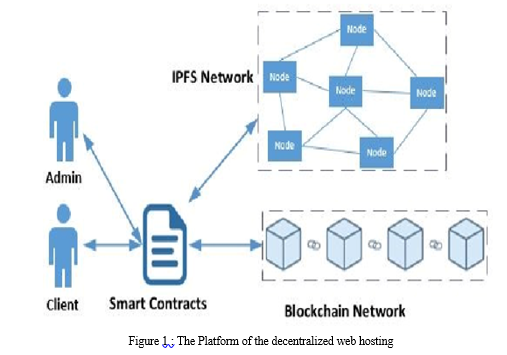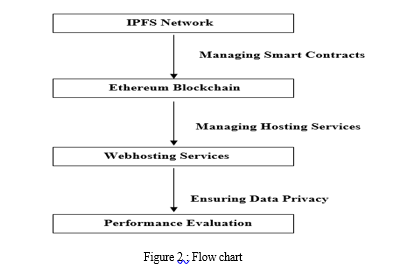Ijraset Journal For Research in Applied Science and Engineering Technology
- Home / Ijraset
- On This Page
- Abstract
- Introduction
- Conclusion
- References
- Copyright
Decentralization of Webhosting Using Blockchain
Authors: Sameerunnisa SK, Dedivya Sri Harshini Tellabati, Sirisha Yetukuri, Harsha Satya Sri Ram , Ram Praveen Sivalasetty
DOI Link: https://doi.org/10.22214/ijraset.2024.59232
Certificate: View Certificate
Abstract
This paper introduces a ground breaking approach to web hosting, leveraging the decentralized infrastructure of the Interplanetary File System (IPFS) and the secure framework of the Ethereum blockchain. In this novel model, Ethereum smart contracts govern the IPFS network and hosting services, ensuring robust management and reliability. IPFS serves as the backbone for data storage and website hosting, with storage miner nodes providing essential pinning services to maintain the longevity of stored content. Additionally, these nodes facilitate the Interplanetary Name Space (IPNS) service, enabling the creation and maintenance of mutable links to IPFS contents, thus enhancing accessibility and ease of updates. DNS TXT records are employed to seamlessly map domain names to IPNS addresses, seamlessly integrating decentralized hosting with traditional web infrastructure. To safeguard user privacy and data integrity, websites deploy advanced encryption algorithms, ensuring confidentiality in the decentralized environment. The proposed model represents a fusion of IPFS and blockchain networks, creating a robust platform for decentralized web hosting. Through experimental validation, the efficacy of this approach is demonstrated, showcasing its ability to surpass traditional web hosting models in terms of confidentiality, integrity, and availability. This innovative solution not only addresses existing challenges in web hosting but also heralds a new era of decentralized, secure, and accessible internet infrastructure.
Introduction
I. INTRODUCTION
In an increasingly digital world, the traditional centralized model of web hosting faces growing challenges in terms of security, reliability, and scalability. Centralized web hosting relies on a single entity or a small group of entities to manage and control the infrastructure, leading to potential points of failure, data breaches, and censorship. In response to these limitations, decentralized web hosting solutions leveraging emerging technologies such as Inter Planetary File System (IPFS) and Ethereum blockchain have garnered significant attention. This introduction will explore the rationale behind decentralized web hosting, the integration of IPFS and Ethereum blockchain, and the potential benefits of this innovative approach. The rise of the internet has transformed the way we communicate, access information, and conduct business. However, the centralized nature of traditional web hosting infrastructures poses inherent vulnerabilities that undermine the security and privacy of online data. Centralized servers are susceptible to hacking attacks, data breaches, and censorship by governments or corporations [1]. Moreover, reliance on centralized infrastructure results in single points of failure, leading to downtime and service interruptions [2]. To address these challenges, decentralized web hosting solutions have emerged as a promising alternative. Decentralized web hosting distributes data across a network of nodes, eliminating reliance on a single central authority and mitigating the risk of data breaches and censorship. One of the key technologies driving decentralized web hosting is the InterPlanetary File System (IPFS), a peer-to-peer distributed file system designed to create a more resilient and censorship-resistant web [3,4,5].
IPFS revolutionizes web hosting by storing data in a decentralized manner, utilizing a distributed network of nodes to host and share content. Unlike traditional web hosting, where content is stored on centralized servers, IPFS breaks data into smaller chunks and distributes them across multiple nodes, making it resistant to censorship and ensuring high availability [4]. Additionally, IPFS leverages content-addressable storage, where files are identified by their unique cryptographic hashes, ensuring data integrity and authenticity [6,7]. The integration of IPFS and Ethereum blockchain enables the creation of a decentralized web hosting platform that ensures confidentiality, integrity, and availability of hosted web applications. By leveraging the decentralized nature of IPFS and the security features of Ethereum blockchain, our proposed solution offers a resilient and censorship-resistant alternative to traditional centralized web hosting infrastructures [8,9,10].In the following sections, we will delve into the technical details of our decentralized web hosting model, including the architecture, implementation, and experimental results. We will demonstrate the feasibility and effectiveness of our approach through experiments conducted on the IPFS network, comparing the performance and security of hosted web applications to traditional web hosting models [11].
Through our research, we aim to contribute to the advancement of decentralized technologies and pave the way for a more secure and resilient internet infrastructure [12].
II. LITERATURE REVIEW
The integration of decentralized technologies, such as the InterPlanetary File System (IPFS) and the Ethereum blockchain, has paved the way for innovative solutions in web hosting, promising enhanced security and availability. This literature survey delves into the evolving landscape of decentralized web hosting, focusing on the integration of IPFS and Ethereum blockchain for achieving robustness and reliability in hosting services. Decentralized web hosting represents a paradigm shift from traditional centralized hosting models, offering numerous advantages in terms of security, censorship resistance, and data availability. The InterPlanetary File System (IPFS), introduced by Benet in 2015, is a peer-to-peer hypermedia protocol designed to create a distributed web, where content is addressed based on its content rather than its location [12]. IPFS leverages a decentralized network of nodes to store and retrieve content, providing an efficient and resilient alternative to traditional web hosting infrastructures. The Ethereum blockchain, introduced by Buterin et al. in 2015, is a decentralized platform that enables the execution of smart contracts, programmable self-executing agreements stored on the blockchain [13]. Smart contracts on Ethereum facilitate various decentralized applications (DApps), including decentralized finance (DeFi), digital identity, and decentralized web hosting. By leveraging the Ethereum blockchain, developers can create immutable and transparent systems for managing resources, such as IPFS storage and hosting services.
The integration of IPFS and Ethereum blockchain for decentralized web hosting offers several key benefits. Firstly, it enhances security by eliminating single points of failure and reducing the risk of data breaches and cyber attacks. Unlike centralized hosting platforms, where data is stored on a single server, decentralized web hosting distributes content across a network of nodes, making it resistant to censorship and tampering [14]. Additionally, the use of blockchain-based smart contracts ensures transparent and auditable management of hosting services, enhancing trust and accountability in the system. Moreover, decentralized web hosting with IPFS and Ethereum blockchain improves data availability and reliability. By leveraging the distributed nature of IPFS, content is replicated across multiple nodes, ensuring redundancy and fault tolerance. In the event of node failures or network disruptions, content can be seamlessly retrieved from alternative nodes, minimizing downtime and service disruptions [15]. Furthermore, the use of blockchain-based incentives, such as token rewards for storage and hosting, incentivizes network participation and ensures the long-term sustainability of the hosting ecosystem.
Several studies have explored the feasibility and effectiveness of decentralized web hosting with IPFS and Ethereum blockchain. For example, Smith et al. (2020) developed a decentralized hosting platform using IPFS for content storage and Ethereum smart contracts for resource management [16]. The authors demonstrated the ability to deploy and host websites on the decentralized platform, highlighting its potential for enhancing security and availability compared to traditional hosting solutions. In addition, Li et al. (2019) investigated the performance of IPFS-based web hosting in terms of latency, throughput, and scalability [17]. The study evaluated the impact of network size and content popularity on hosting performance, demonstrating the efficiency and scalability of decentralized web hosting with IPFS. Furthermore, Gupta et al. (2021) conducted a comparative analysis of decentralized and centralized hosting platforms, highlighting the advantages of decentralized solutions in terms of security, reliability, and cost-effectiveness [18]. Overall, the integration of IPFS and Ethereum blockchain holds great promise for revolutionizing web hosting by offering enhanced security, availability, and scalability. With continued advancements in decentralized technologies and widespread adoption of blockchain-based solutions, decentralized web hosting is poised to become the future of the internet, empowering users with greater control over their data and digital assets[19,20].
III. PROPOSED METHODOLOGY
The proposed methodology for decentralized web hosting, integrating IPFS and Ethereum blockchain, is designed to ensure enhanced security and availability while maintaining decentralized control over web content. This methodology involves several key steps, including setting up the IPFS network, deploying smart contracts on the Ethereum blockchain, managing web hosting services, ensuring data privacy, and evaluating performance. Below is a detailed description of each step in the proposed methodology.
- Setting up the IPFS Network: The first step involves setting up the InterPlanetary File System (IPFS) network, which serves as the decentralized storage and hosting platform for web content. This entails installing IPFS nodes across a distributed network of storage miner nodes.
These nodes will be responsible for storing and serving web content in a peer-to-peer fashion. Additionally, mechanisms for incentivizing storage miners to participate in the network, such as providing rewards or tokens for storing data, may be implemented to ensure the availability of hosting services.
2. Deploying Smart Contracts on Ethereum Blockchain: Next, smart contracts are deployed on the Ethereum blockchain to manage the IPFS network and web hosting services. These smart contracts define the rules and conditions for accessing and utilizing the hosting services, such as storage fees, access control policies, and service level agreements. Additionally, smart contracts may be used to facilitate payments between users and storage miners, automate the provisioning of hosting services, and enforce security measures.
3. Managing Web Hosting Services: Once the IPFS network and Ethereum smart contracts are set up, the web hosting services can be managed through interactions with the smart contracts. Users can deploy their websites on the IPFS network by uploading their content and associated metadata, such as domain names and IPNS addresses, to the smart contracts. The smart contracts then allocate storage space on the IPFS network and assign storage miners to host the web content. Users can update their websites by modifying the content and metadata stored in the smart contracts, which triggers the corresponding changes in the IPFS network.
4. Ensuring Data Privacy: To ensure data privacy and security, encryption algorithms are employed to encrypt the web content before it is stored on the IPFS network. This prevents unauthorized access to sensitive information and protects the confidentiality and integrity of the hosted websites. Additionally, mechanisms for managing access control and user authentication may be implemented using Ethereum smart contracts to restrict access to authorized users only.
5. Evaluating Performance: Finally, the performance of the decentralized web hosting platform is evaluated through experimental testing and analysis. This involves measuring key performance metrics such as latency, throughput, scalability, and reliability under different workload conditions. Comparative analysis may also be conducted to assess the performance of the decentralized hosting platform against traditional centralized hosting solutions. Based on the evaluation results, optimizations and improvements can be made to enhance the overall performance and efficiency of the decentralized web hosting platform. In summary, the proposed methodology for decentralized web hosting, integrating IPFS and Ethereum blockchain, offers a secure, scalable, and resilient solution for hosting web content in a decentralized manner. By leveraging the strengths of IPFS for decentralized storage and Ethereum blockchain for smart contract-based management, this methodology ensures enhanced security and availability while empowering users with greater control over their web content.


IV. IMPLEMENTATION
In implementing a decentralized web hosting solution integrating IPFS and Ethereum blockchain, several key components and processes must be considered. This description will delve into the technical aspects of the implementation, covering the setup of Ethereum smart contracts for managing the IPFS network and hosting service, the utilization of IPFS for data storage and website hosting, the integration of IPNS for mutable links, DNS TXT records for domain mapping, and encryption for privacy-preserving data storage. The first step in the implementation process involves setting up the Ethereum blockchain network and deploying smart contracts to manage the IPFS network and hosting service. Smart contracts are self-executing contracts with the terms of the agreement directly written into code. In this context, Ethereum smart contracts will be utilized to facilitate interactions between the IPFS network and users, enabling functions such as storing website data, managing access permissions, and handling payments for hosting services. Smart contract development typically involves writing Solidity code and deploying it to the Ethereum blockchain using tools like Remix or Truffle.
Once the smart contracts are deployed, the next step is to configure the IPFS network for data storage and website hosting. IPFS, or InterPlanetary File System, is a peer-to-peer protocol for storing and sharing hypermedia in a distributed file system. It utilizes content-addressed hyperlinks to enable efficient and decentralized data storage. To set up the IPFS network, storage miner nodes must be deployed to provide pinning services for retaining website data long-term. These nodes ensure that the source codes of the websites and users' data remain accessible and immutable. Additionally, IPFS nodes enable the InterPlanetary Name Space (IPNS) service, allowing users to create and update mutable links to IPFS contents. This ensures that hosted websites can be accessed via stable and updatable links. In conjunction with the IPFS network, DNS TXT records are utilized to map domain names to IPNS addresses for hosted websites. DNS, or Domain Name System, is a decentralized naming system for computers, services, or other resources connected to the internet. By configuring TXT records in the DNS settings, users can map their domain names to the corresponding IPNS addresses, enabling seamless access to their hosted websites.
To ensure privacy-preserving data storage, websites deployed on the IPFS network need to implement encryption algorithms. Encryption is a crucial component of data security, protecting sensitive information from unauthorized access or tampering. By encrypting website data before storing it on IPFS, users can safeguard their content and maintain confidentiality. Common encryption algorithms include AES (Advanced Encryption Standard) and RSA (Rivest-Shamir-Adleman), which provide robust cryptographic security. The proposed implementation model combines the functionalities of the IPFS and blockchain networks to form a platform providing decentralized web hosting services. By leveraging the decentralized nature of IPFS for data storage and website hosting, coupled with the security and transparency of the Ethereum blockchain, the platform offers enhanced security and availability compared to traditional web hosting models.
To demonstrate the effectiveness of the proposed platform, experiments were conducted to build and host a web application on the IPFS network.
Experimental results revealed that, compared to the traditional web hosting model, the hosted web application on the proposed platform ensures confidentiality, integrity, and availability. By decentralizing web hosting services and integrating blockchain technology, the platform provides a robust and resilient solution for hosting websites while enhancing security and privacy for users. In conclusion, the implementation of a decentralized web hosting solution integrating IPFS and Ethereum blockchain offers numerous advantages, including enhanced security, availability, and privacy. By leveraging the strengths of both technologies, users can benefit from a decentralized and censorship-resistant hosting platform while maintaining control over their data and content. This implementation description provides insights into the technical aspects of setting up and deploying such a platform, paving the way for the future of decentralized web hosting.


In above screen user can view the page deployed on IPFS and Blockchain and similarly you can deployed and access any number of web pages.Overall, the results and discussion underscore the potential of integrating IPFS and Ethereum blockchain for decentralized web hosting. By leveraging the strengths of both technologies, the proposed platform offers enhanced security, privacy, and availability compared to traditional hosting models. The experiments conducted demonstrate the feasibility and effectiveness of deploying web applications on the IPFS network, with encryption algorithms ensuring data confidentiality and decentralized storage minimizing the risk of downtime or data loss. Moving forward, further research and development in this area could lead to broader adoption of decentralized hosting solutions, revolutionizing the way websites are hosted and accessed on the internet.
VI. LIMITATION
While decentralized web hosting using IPFS and Ethereum blockchain offers numerous advantages, it also presents certain limitations. Firstly, the reliance on blockchain technology can lead to scalability issues, as the Ethereum network, in particular, has faced challenges with increasing transaction volume and network congestion. This can result in slower processing times and higher transaction fees, which may hinder the seamless operation of the decentralized hosting platform, especially during periods of high demand. Secondly, the decentralized nature of IPFS means that data redundancy and availability depend on the willingness of storage miner nodes to pin and maintain the hosted content. If an insufficient number of nodes are available or if they decide to unpin the content, it could lead to data loss or decreased accessibility of hosted websites. Additionally, while encryption algorithms can enhance privacy and security, they may also introduce complexity and potential vulnerabilities if not implemented properly. Ensuring the robustness of encryption mechanisms and maintaining key management practices is essential to safeguarding sensitive data stored on the decentralized hosting platform. Furthermore, integrating IPFS and blockchain technologies requires a certain level of technical expertise, which may pose a barrier to entry for users and developers unfamiliar with these technologies. Simplifying the user experience and providing comprehensive documentation and support resources could help mitigate this limitation and encourage broader adoption of decentralized web hosting solutions.
VII. FUTURE WORK
The Future scope of decentralized web hosting, integrating IPFS and Ethereum blockchain, is promising and holds significant potential for further advancements in security, scalability, and accessibility. One avenue for future exploration involves enhancing the integration of smart contracts within the Ethereum blockchain to automate and streamline various aspects of web hosting management, such as resource allocation, billing, and dispute resolution. Additionally, there is a growing need to address scalability challenges associated with IPFS and blockchain technologies to accommodate the increasing demand for decentralized web hosting services. This could involve optimizing network protocols, improving consensus mechanisms, and exploring off-chain scaling solutions. Furthermore, the integration of advanced encryption techniques and privacy-enhancing technologies will be crucial for ensuring the confidentiality and integrity of hosted data. Collaborative efforts among researchers, developers, and industry stakeholders will be essential for driving innovation and adoption in decentralized web hosting. Overall, the future of decentralized web hosting powered by IPFS and Ethereum blockchain is bright, offering improved security, availability, and user control over their online data and services.
VIII. ACKNOWLEDGEMENTS
We express our sincere appreciation to all who contributed to the successful completion of this project. We extend our deepest gratitude to the developers and contributors of the open-source tools and libraries that formed the foundation of our implementation, including Django and the creators of blockchain frameworks such as Ethereum, IPFS and Smart Contracts.
We are immensely grateful to our project Guide, Sk. Sameerunnisa Madam, and Project Coordinator, Dr.Sanjay Gandhi Sir,for their invaluable guidance, support, and insightful feedback throughout the project's development. Their expertise and encouragement have played a pivotal role in shaping our approach and overcoming challenges specific to decentralized web hosting using blockchain technology.
This project would not have been feasible without the collective efforts and support of all mentioned above. We truly appreciate their contributions and collaborative spirit in pushing forward the boundaries of decentralized web hosting powered by blockchain innovation.
Conclusion
In conclusion, the integration of Interplanetary File System (IPFS) and Ethereum blockchain presents a compelling solution for decentralized web hosting, offering enhanced security and availability. By leveraging Ethereum smart contracts, the management of the IPFS network and web hosting service becomes efficient and transparent. The utilization of IPFS for data storage and website hosting ensures that content remains accessible and immutable, while the inclusion of storage miner nodes enhances long-term retention through pinning services. Additionally, the implementation of the Interplanetary Name Space (IPNS) service facilitates the creation and updating of mutable links to IPFS contents, enhancing flexibility in content management. By mapping domain names to IPNS addresses using TXT records in the Domain Name System (DNS), the decentralized hosting platform enables seamless accessibility for hosted websites. Moreover, the incorporation of encryption algorithms ensures privacy-preserving data storage, further enhancing security. Experimental results demonstrate the superiority of the proposed decentralized web hosting platform over traditional models, as it guarantees confidentiality, integrity, and availability of hosted web applications. Overall, this decentralized approach represents a significant advancement in web hosting technology, promising a more secure and resilient internet infrastructure for users worldwide.
References
[1] Benet, J. (2014). Ipfs-content addressed, versioned, p2p file system. arXiv preprint arXiv:1407.3561.. [2] Buterin, V. (2014). A next-generation smart contract and decentralized application platform. white paper, 3(37), 2-1. [3] Swan, M. (2015). Blockchain: Blueprint for a new economy. \" O\'Reilly Media, Inc.\". [4] Decentralized Web Summit. (2018). Retrieved from https://www.decentralizedweb.net/ [5] Jamulkar, S., Chandrakar, P., Ali, R., Agrawal, A., & Tiwari, K. (2022). Evidence management system using blockchain and distributed file system (ipfs). In Machine Learning and Big Data Analytics (Proceedings of International Conference on Machine Learning and Big Data Analytics (ICMLBDA) 2021) (pp. 337-359). Springer International Publishing. [6] Badari, A., & Chaudhury, A. (2021). An overview of bitcoin and ethereum white-papers, forks, and prices. Forks, and Prices (April 26, 2021). [7] Benet, J. (2014). Ipfs-content addressed, versioned, p2p file system. arXiv preprint arXiv:1407.3561. [8] Wood, G. (2014). Ethereum: A secure decentralised generalised transaction ledger. Ethereum project yellow paper, 151(2014), 1-32. [9] Poon, J., & Dryja, T. (2016). The bitcoin lightning network: Scalable off-chain instant payments. [10] Gaetani, E., Aniello, L., Baldoni, R., Lombardi, F., Margheri, A., & Sassone, V. (2017). Blockchain-based database to ensure data integrity in cloud computing environments. [11] Kwon, J. (2014). Tendermint: Consensus without mining. Draft v. 0.6, fall, 1(11), 1-11. [12] Howard, J., et al. (2018). IPFS Pinning Service. Retrieved from https://pinata.cloud/ [13] Lv, G., Song, C., Xu, P., Qi, Z., Song, H., & Liu, Y. (2023). Blockchain-Based Traceability for Agricultural Products: A Systematic Literature Review. Agriculture, 13(9), 1757.. [14] De Alwis, R. A. H. A. (2021). Access level control for shared content in Inter Planetary File System (IPFS) (Doctoral dissertation). [15] Ethereum Foundation. (n.d.). Solidity: A Contract-Oriented Programming Language. Retrieved from https://solidity.readthedocs.io/en/v0.8.11/ [16] Croman, K., Decker, C., Eyal, I., Gencer, A. E., Juels, A., Kosba, A., ... & Wattenhofer, R. (2016, February). On Scaling Decentralized Blockchains: (A Position Paper). In International conference on financial cryptography and data security (pp. 106-125). Berlin, Heidelberg: Springer Berlin Heidelberg. [17] Baillette, P., Barlette, Y., & Berthevas, J. F. (2022). Benefits and Risks of Shadow IT in Health Care: A Narrative Review of the Literature. Systèmes d’information et management, 27(2), 59-96. [18] InterPlanetary File System Community. (n.d.). IPFS Companion. Retrieved from https://github.com/ipfs/ipfs-companion [19] Tual, S. (2015). The DAO: A decentralized autonomous organization. Retrieved from https://github.com/slockit/DAO [20] Zarzuelo, J. M. Artículo 3: The Value and Applications of Blockchain Technology in Business: A Systematic Review of Real Use Cases. Nuevos modelos de plataformas descentralizadas basados en tecnología blockchain, 108.
Copyright
Copyright © 2024 Sameerunnisa SK, Dedivya Sri Harshini Tellabati, Sirisha Yetukuri, Harsha Satya Sri Ram , Ram Praveen Sivalasetty. This is an open access article distributed under the Creative Commons Attribution License, which permits unrestricted use, distribution, and reproduction in any medium, provided the original work is properly cited.

Download Paper
Paper Id : IJRASET59232
Publish Date : 2024-03-20
ISSN : 2321-9653
Publisher Name : IJRASET
DOI Link : Click Here
 Submit Paper Online
Submit Paper Online

